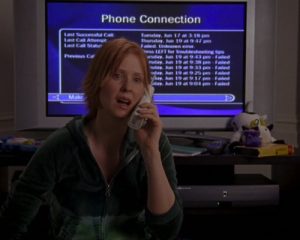By Phillip Swann
The TV Answer Man –@tvanswerman
More than 30 years as a TV journalist. Former TiVo owner.
TV Answer Man, can you explain why TiVo never became that next big thing everyone always said it would become? Does it even exist now? — Justin, San Jose, California.
Why Was TiVo Such a Big Thing?
Justin, about two decades ago, TiVo was arguably the biggest thing in television, perhaps in all of entertainment. The HBO comedy, Sex and the City, devoted an entire episode to a character’s addiction to the little Digital Video Recorder. Characters in other shows such as Friends and The Sopranos would name-drop TiVo relentlessly. And Americans, famous and not, would stop saying they would record a show; no, they would say they ‘TiVo-ed’ it.
TiVo’s popularity among entertainment elites was not an accident. To generate free publicity, the company distributed free receivers to numerous celebrities.
“These are people who are influential with consumers and who have a big impact on pop culture,” TiVo executive VP Brodie Keast told Fast Company magazine in 2002.
See Amazon’s best-selling electronics!
Many businesses have tried this technique in the past, and since, and failed. But TiVo succeeded in winning Hollywood’s heart because it was a great product. The DVR service, which sought to replace the clunky VCR, enabled you to pause live TV and record 80 hours of programming without a videotape. Then FCC Chairman Michael Powell, who is not prone to gushing, called TiVo, “God’s machine.”
Why Did TiVo Stop Growing?
But TiVo was never able to turn buzz into buys. After the first five years of relentless marketing strategies, TiVo had just 700,000 subscribers.
Yes, subscribers. You had to pay a monthly fee, ranging from $10 to $13 in addition to the cost of the box which was $249 in 2003.
See Amazon’s best-selling electronics!
That was problem number one. It was too expensive.
Second, the company placed too much emphasis on retail sales rather than focusing on licensing and partnerships. Consequently, cable TV operators launched their own DVR services, which sharply limited TiVo’s growth potential.

If a cable subscriber already had a DVR service, why buy a TiVo?
They didn’t.
Third, TiVo still had to compete with the dinosaur VCR. In the early 2000s, most consumers were still happy with the VCR, particularly when they heard that TiVo required a monthly subscription. The VCR, which TiVo and DVR rival, ReplayTV, sought to replace, was still in more than 90 percent of U.S. homes.
Consumers didn’t believe the VCR was perfect; the 12:00 blinking light on the receiver’s front panel was an American cliche. However, most viewers were comfortable with the VCR at the time because it was cheap to buy and relatively simple to use. Pop in a tape, hit record or play and you’re done.
So why spend $200 to $500 on a new TV recording device when you already have one that works? Plus, the DVR required thata monthly subscription fee and couldn’t play back those stacks of videotapes sitting around most U.S. living rooms.
TiVo eventually abandoned the all-retail sales approach and began licensing the DVR to TV providers such as DIRECTV but it was too late. TiVo never became a mass product, and it certainly never took over the world, as so many predicted it would. Like so many tech fads, it never broke through phase one.
The company, amazingly enough, is still around, peddling Roku-like products and similar accessories.
But you don’t hear TiVo mentioned very often in TV shows these days.
Have a question about new TV technologies? Send it to The TV Answer Man at swann@tvanswerman.com Please include your first name and hometown in your message.
The TV Answer Man is veteran journalist Phillip Swann who has covered the TV technology scene for more than three decades. He will report on the latest news and answer your questions regarding new devices and services that are changing the way you watch television. See the bio for Phillip Swann here.


Better than TiVo, better than all the DVR’s , the DVD recorder w/ a hard drive. Edit out commercials, burn to a disc. Put up to 6 or 8 hrs on 1 disc , I miss mine, today they are almost non excitant and way over priced
I always thought that Directv should have bought TiVo, it could have been DirecTiVo.
TiVo sold a DirecTV model that many nicknamed the DirecTivo. I had one for a few years around 2003. Upgraded it by adding a larger hard drive and network card (no more dialup modem phone line required, and I could export the high-quality MPEG DirecTV compression to burn to DVD). I sold it after a couple years for more than I bought it for to someone in Canada (these were never sold there and I think they paid their DirecTV sub some nefarious way to get US programing). Mike had a Lifetime sub (no monthly frees). Also this model could record two shows at once, or record one show and watch live TV at the same time, which was a first of a kind back then.
LOL I’m still using TiVo after 22 years and love it! If you are a cable TV subscriber (I use Xfinity) it is by far the best way to manage and enjoy a home with multiple TV’s!!! Once you buy a unit with a lifetime subscription (pricey but available used) and some mini units for extension TV’s you’ll never pay for equipment again!
I finally gave up on on tivo after 22 years when frontier fios started removing channels from their tv services like nba tv, nba league pass and some other channels i liked . Then when i tried to switch to spectrum they tol me they would be using cable cards soon so i switched to directv with gemini which is awfull! I truly hate streaming!!!!! now my next move is to go back is to satellite either direct or dish,